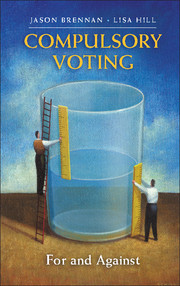Book contents
- Frontmatter
- Contents
- Acknowledgments
- Part I Medicine Worse Than the Disease?
- Part II Compulsory Voting Defended
- 5 Compulsory Voting: Background, Effects, Feasibility, and Basic Premises
- 6 Turnout, Abstention, and Democratic Legitimacy
- 7 Is Compulsory Voting an Unjustified Burden on Personal Autonomy?
- 8 Is Requiring People to Vote Contrary to Democratic Values?
- 9 Conclusion
- Bibliography
- Index
- References
5 - Compulsory Voting: Background, Effects, Feasibility, and Basic Premises
Published online by Cambridge University Press: 05 June 2014
- Frontmatter
- Contents
- Acknowledgments
- Part I Medicine Worse Than the Disease?
- Part II Compulsory Voting Defended
- 5 Compulsory Voting: Background, Effects, Feasibility, and Basic Premises
- 6 Turnout, Abstention, and Democratic Legitimacy
- 7 Is Compulsory Voting an Unjustified Burden on Personal Autonomy?
- 8 Is Requiring People to Vote Contrary to Democratic Values?
- 9 Conclusion
- Bibliography
- Index
- References
Summary
Introduction
Simply put, compulsory voting exists where the state imposes a legal requirement to vote. The idea of being compelled to vote is anathema to many who live in Western democracies because it seems to run counter to both democratic and liberal values. But even though I agree that, in principle, voluntary political participation is preferable to obligatory participation, I argue in the following chapters that requiring people to vote can be reconciled with both liberal and democratic values.
In defending compulsory voting, I write as a normative political theorist, but I also approach the issue as a political scientist who is wary of normative arguments about elections and voting that do not engage with the empirical world. These kinds of arguments tend, either consciously or unconsciously, to embody assumptions about that world that, in turn, justify real-world laws and practice. Therefore, my argument is informed, where possible, by the empirical data and actual trends in electoral and political behavior. But, in the end, it is a normative argument written from a political-theory perspective.
Much has been written and said about compulsory voting, but quite a lot of it is controvertible. For this reason, the following set of arguments tends to be structured in response to criticism of compulsory voting and the high and socially even turnout it is able to deliver.
- Type
- Chapter
- Information
- Compulsory VotingFor and Against, pp. 111 - 124Publisher: Cambridge University PressPrint publication year: 2014



